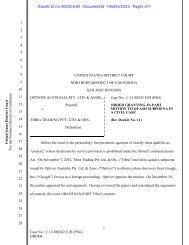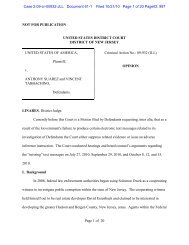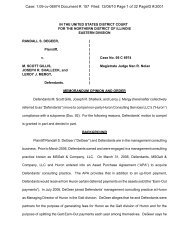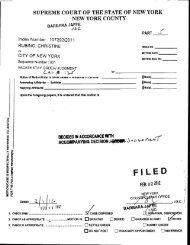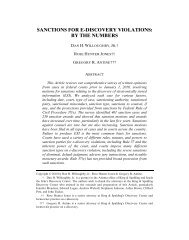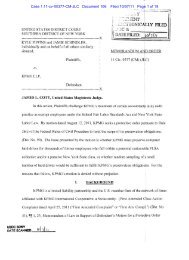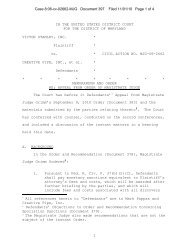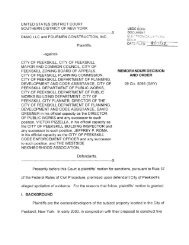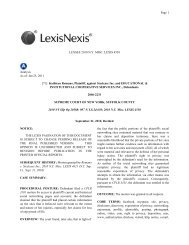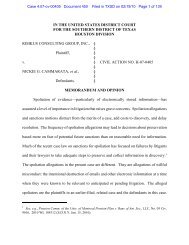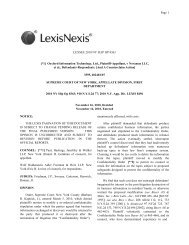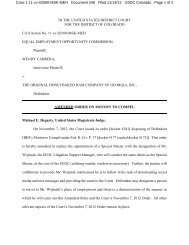Katiroll Company, Inc. v. Kati Roll and Platters - E-Discovery Law Alert
Katiroll Company, Inc. v. Kati Roll and Platters - E-Discovery Law Alert
Katiroll Company, Inc. v. Kati Roll and Platters - E-Discovery Law Alert
You also want an ePaper? Increase the reach of your titles
YUMPU automatically turns print PDFs into web optimized ePapers that Google loves.
2011 U.S. Dist. LEXIS 85212, *<br />
Page 6<br />
records of phone calls or text messages to Dr. Latha (or<br />
alleges that such phone calls were made on the phones of<br />
any third parties or pay phones), the Court will consider<br />
sanctions against him. As of now, the existence of such<br />
emails is too hypothetical to impose sanctions.<br />
5 See Local Civil Rule 26.1(d)(1). The Court also<br />
notes that "archive" is the primary email management<br />
function on "Gmail." As such, it is unusual<br />
though not unheard of, for users to actually<br />
delete emails.<br />
7. Defendants' New Facebook Page<br />
Plaintiff argues that Defendants made a new Facebook<br />
page <strong>and</strong> did not disclose its existence in a discovery<br />
response. The Court agrees that Defendants should have<br />
disclosed its existence, but because Plaintiff has found the<br />
page independently <strong>and</strong> Defendants created [*20] the<br />
page in order to comply with this Court's preliminary<br />
injunction, sanctions are not appropriate. See Kounelis,<br />
529 F. Supp. 2d at 519 (prejudice to discovering party<br />
considered when imposing sanctions).<br />
8. Financial Documents<br />
Plaintiff requested that Defendants produce restaurant<br />
sales reports as well as other financial data. Plaintiff<br />
does not complain about the production of many of these<br />
items. However, Plaintiff does complain that it has not<br />
received the point of sale reports, h<strong>and</strong> logs for cash<br />
transactions, that the corporation's tax returns were unsigned,<br />
the corporation's bank account statements redacted<br />
several ATM transactions (which may be relevant<br />
for piercing analysis), <strong>and</strong> that Defendants did not produce<br />
a copy of their insurance policy.<br />
Defendants respond that the proprietary point of sale<br />
software has created problems for such production, that<br />
counsel is investigating the redaction to the bank account<br />
statements, <strong>and</strong> that they did produce the copy of the<br />
insurance policy. Defendants make no representations<br />
about the h<strong>and</strong> logs or tax returns. Nor do Defendants<br />
argue that the requests are in any way overbroad.<br />
The Court finds that these are run-of-the-mill discovery<br />
issues, [*21] on which the parties should confer to<br />
resolve. The Court does not believe a sanction or order<br />
compelling production is appropriate at this juncture.<br />
There has yet to be a litigation in which every document<br />
was produced in a timely fashion. The Court also sees no<br />
reason why Defendants must produce electronic records<br />
of their bank accounts to Plaintiff or need bear the cost of<br />
putting the data into a spreadsheet. Defendants' counsel<br />
shall address each of these discovery issues in his weekly<br />
report until they are resolved.<br />
9. Deposition of Niraj Jivani<br />
While both parties agree that Plaintiff will have another<br />
opportunity to depose Niraj Jivani, Plaintiff argues<br />
that it should be compensated for the costs of the additional<br />
deposition. Plaintiff suggests that this is justified<br />
because Defendants were late in the production of several<br />
items, including their insurance policy, prior to Mr.<br />
Jivani's deposition. The Court disagrees.<br />
As suggested by Defense counsel, the need for a<br />
supplemental deposition was also necessitated by Plaintiff's<br />
insistence on taking Mr. Jivani's deposition only a<br />
few weeks after new counsel arrived on the case, without<br />
the opportunity for that counsel to come up to speed [*22]<br />
with the discovery requested. Further, it appears that<br />
Plaintiff has four more hours of questions, not all of which<br />
can be related to the insurance policy. As such, Plaintiff<br />
would have had to schedule an additional day of deposition<br />
anyway. Thus, the Court awards no fees for the additional<br />
deposition.<br />
10. Counsel Are Directed to Conduct Themselves with<br />
the Collegiality <strong>and</strong> Good Faith that is Befitting of New<br />
Jersey Attorneys<br />
The Court reminds counsel that attorneys in this jurisdiction<br />
are expected to conduct themselves with professionalism,<br />
to creatively find solutions to common<br />
problems, <strong>and</strong> to cooperate with each other. The email <strong>and</strong><br />
other correspondence that has appeared before the Court<br />
do not reflect these high st<strong>and</strong>ards. Emails accusing opposing<br />
counsel of ethical violations, resistance to simple<br />
requests, attempts to pass responsibility to the other party<br />
for simple discovery requests, <strong>and</strong> inflexibility are reflected<br />
in many recent communications in this case. (See,<br />
e.g., DolichEx. I; Doc. No. 114; Doc. No. 117; Doc No.<br />
108-2; Doc. No. 118; Doc. 129 Ex. 2). The Court also<br />
reminds the parties that their attempts to pass the burden<br />
of discovery to each other often result in more [*23] work<br />
in emails than the work it would take to obtain the<br />
document themselves.<br />
The Court underst<strong>and</strong>s that there is animosity between<br />
the parties. The testimony at the preliminary injunction<br />
hearing was enough to make that abundantly<br />
clear. However, despite the animosity between their clients,<br />
attorneys before this Court are expected to confer in<br />
good faith prior to bringing issues before the Court.<br />
III. CONCLUSION<br />
For the foregoing reasons, the Court grants in part<br />
<strong>and</strong> denies in part the request for spoliation sanctions <strong>and</strong><br />
grants certain requests for the production of documents.<br />
The Court files an appropriate order concurrent with this<br />
opinion.



